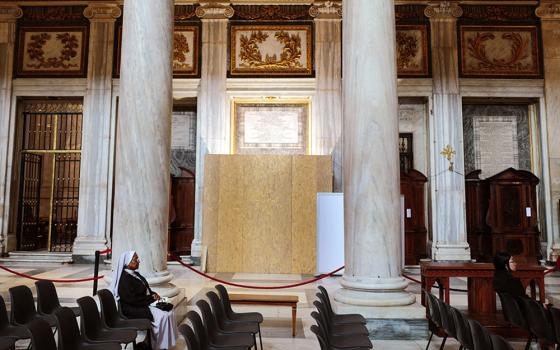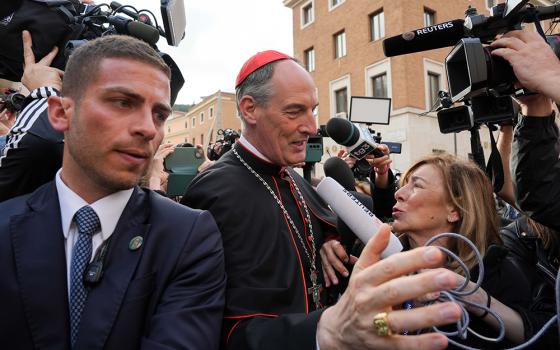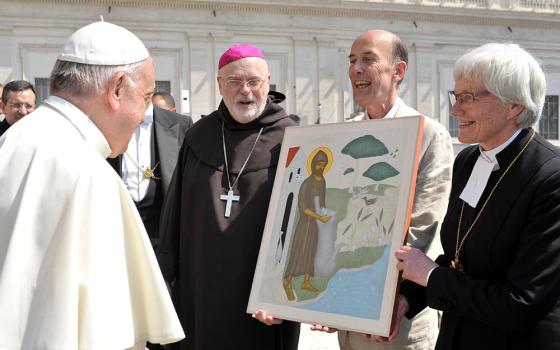Two news items this week pointed to the arduousness of Pope Francis' efforts to reform the central administrative organs of the Holy See. Pope Francis and other Vatican officials met with officials from the Dominican Republic to discuss the ongoing investigation of Joseph Wesolowski, the former archbishop and nuncio to the Dominican Republic who was defrocked earlier this year on charges of sex abuse of minors. The other item was Cardinal George Pell's statement that his work reforming the finances of the Holy See had unearthed millions of unaccounted-for euros in the Vatican bank.
Whatever the other achievements of the last two pontificates, it is becoming painfully obvious that the degree of corruption within the highest ranks of the hierarchy is almost unimaginable. The cover-up of sex crimes and the financial shenanigans have no basic connection except that as the investigations continue, many, many more prelates are likely to be exposed for one of the two crimes, or both.
The news that the Vatican is working with authorities in the Dominican Republic is not earth-shattering, but it is meme-shattering. The New York Times did a masterful job exposing just how despicable Wesolowski's sex crimes were, but its reporting overplayed the idea that the Vatican was circling the wagons in the face of Dominican claims to jurisdiction in the case. I am sure there were some prosecutors champing at the bit to try Wesolowski in the Dominican Republic. I am also sure there were plenty of high-level government officials who knew there existed plenty of pictures of them mugging with the nuncio. In an overwhelmingly Catholic country like the Dominican Republic, the nuncio is a key player in the diplomatic world. Some Dominican authorities, no doubt, wanted Wesolowski tried where the crimes were committed, in the Dominican Republic, but others were only too happy to have the Vatican take a complicated and difficult case off their hands.
Working with the Dominican officials has only been one of the challenges facing Pope Francis in this case. Taking on Wesolowski means taking on his powerful allies. He was a "fair-haired boy" in Polish ecclesiastical circles, ordained a priest by then-Cardinal Karol Wojtyla and ordained a bishop by Wojtyla after he had become Pope John Paul II. There are others with a vested interest in perpetuating the "John Paul the Great" meme, a meme that appears less plausible when you consider John Paul's track record on clergy sex abuse. I do not doubt that John Paul II is, as the Church has proclaimed him, a saint in heaven. We canonize the man, not the pontificate. But I can think of no greater personal quality needed in a pope than being a good judge of character, and Pope John Paul II was not a good judge of character.
The Church is still paying for that deficit in judgment. The coterie around John Paul II remains very influential. How influential? Months before Wesolowski was removed from his post in August 2013, he succeeded in getting the Vatican's Congregation for Bishops to demand the resignation of the archbishop of San Juan, Puerto Rico, Msgr. Roberto Gonzalez, on charges that were a complete fabrication. Someone -- and it had to be someone who thought they were assisting Wesolowski -- then leaked the letter demanding the resignation to the press. The Church in Puerto Rico was scandalized, but in the game of Vatican intrigue, attacking the people's faith is small peanuts when there are clerical politics to be played. Pope Benedict XVI, a man of towering intellectual and spiritual gifts, was a terrible manager, the Vatican was a sea of dysfunction, and we have to ask ourselves: If Benedict had not resigned, would Wesolowski still be in office? Would the archbishop of San Juan have been removed?
The slow pace of reform when it comes to the issue of clergy sex abuse of minors is, I am sure, very painful to the victims. It is painful to those of us who are not victims but who are revolted by the false values that place ecclesiastical careers ahead of justice. But the Wesolowski case shows what Pope Francis is up against. It is more important that the Church gets this right than that it gets it fast. Precedents are being set. Procedures must be seen to be fair, just and effective. Transparency is not easily introduced to a system that has never known it. I am confident that the commission the Holy Father has established, led by Cardinal Sean O'Malley, will achieve great things, but those great things will not happen tomorrow. It is hard to be patient, but the pope and the cardinal are up against entrenched patterns of behavior and thought as well as tackling powerful interests, networks of friendship and protection, and entrenched patterns of behavior and thought do not change overnight.
A similar example of the difficulty of reform emerged when Cardinal Pell, now leading the Prefecture on the Economy, said his investigators had uncovered "hundreds of millions of euros that did not appear on the Holy See's balance sheet." Those euros represent similar patterns of behavior and thought, all premised on a lack of accountability to anyone once you have a zucchetto on your head, patterns that have invited, permitted and rewarded financial corruption. That money belongs to someone, and those someones will want it back, or they will be seeking to erase any connection to it, or otherwise trying to obfuscate Cardinal Pell's efforts to bring transparency -- and decency -- to the Church's financial processes.
I would suggest, too, that there is a link between the two efforts at reform. The Wesolowski case went to the Congregation for the Doctrine of the Faith, which investigates clergy sex abuse cases. So far as we know, no one investigating Wesolowski has taken the sage advice Deep Throat gave to Woodward and Bernstein: "Follow the money." Nuncios serve as conduits for large sums of money: Donations to Peter's Pence headed to Rome and contributions from Propaganda Fide headed from Rome both flow through the offices of local nuncios. In some countries, this practice may be necessitated because of government hostility to the Church. But the practice should end except in those countries. The money should be directly deposited from the diocese to Rome or from Propaganda Fide to the diocese, and a copy of the deposit receipt should be sent to the nuncio. You can make a tidy sum of cash by depositing a check in your own account for a few months, collecting the interest, then forwarding it to its intended recipient. Maybe enough for a beach house during your vacation, or for a new car. I would be willing to place a bet that someone who is clearly a very sick and very evil man capable of raping children is capable of not only corrupting youth but of being corrupt when it comes to financial matters.
This is the kind of entrenched malevolence the pope is up against. Yet in under two years, Pope Francis has found precisely the right person, Cardinal O'Malley, to tackle the sex abuse mess, and precisely the right person, Cardinal Pell, to tackle the financial mess. We may come to learn that Papa Bergoglio is a bad judge of character in other regards, but in these regards, he has not turned the henhouse over to the fox, but has brought in two determined men quite capable of tackling any obstacles. That does not mean everything will be fixed in a day, or a week, or a year. But the long, sad history of corruption and mismanagement and unaccountability is coming to an end.




